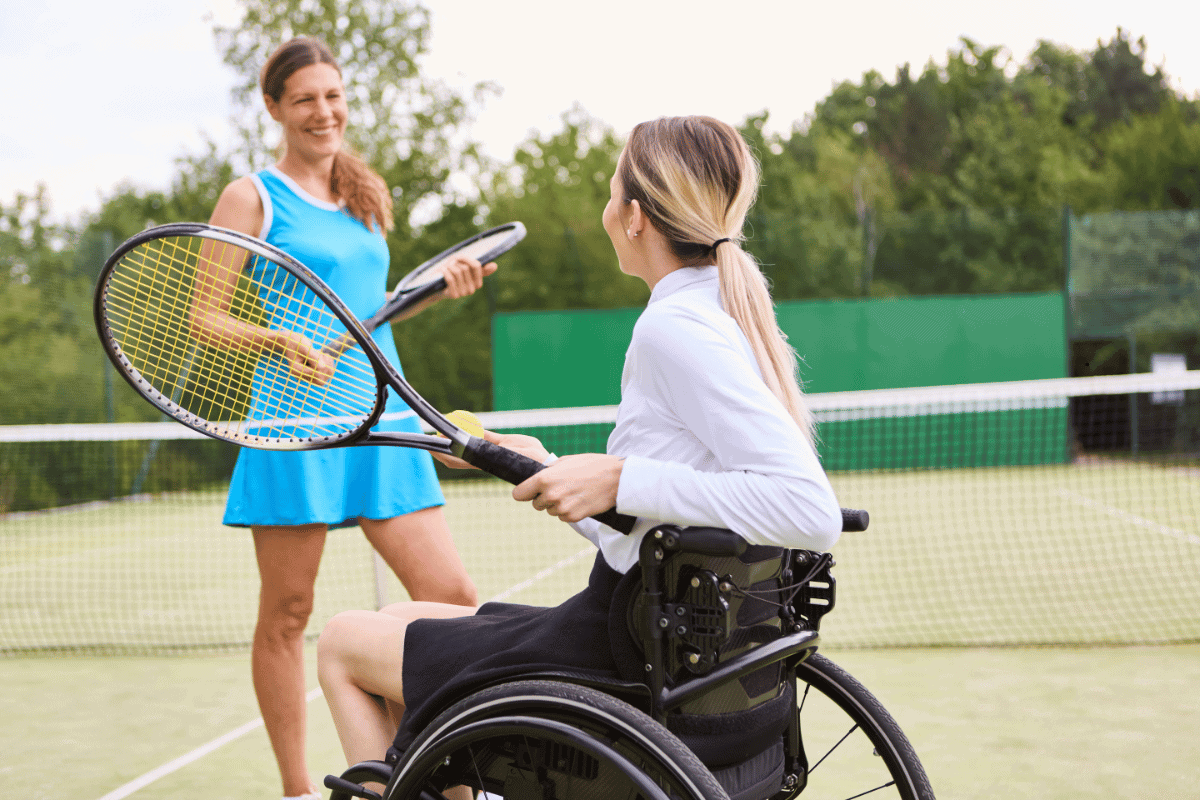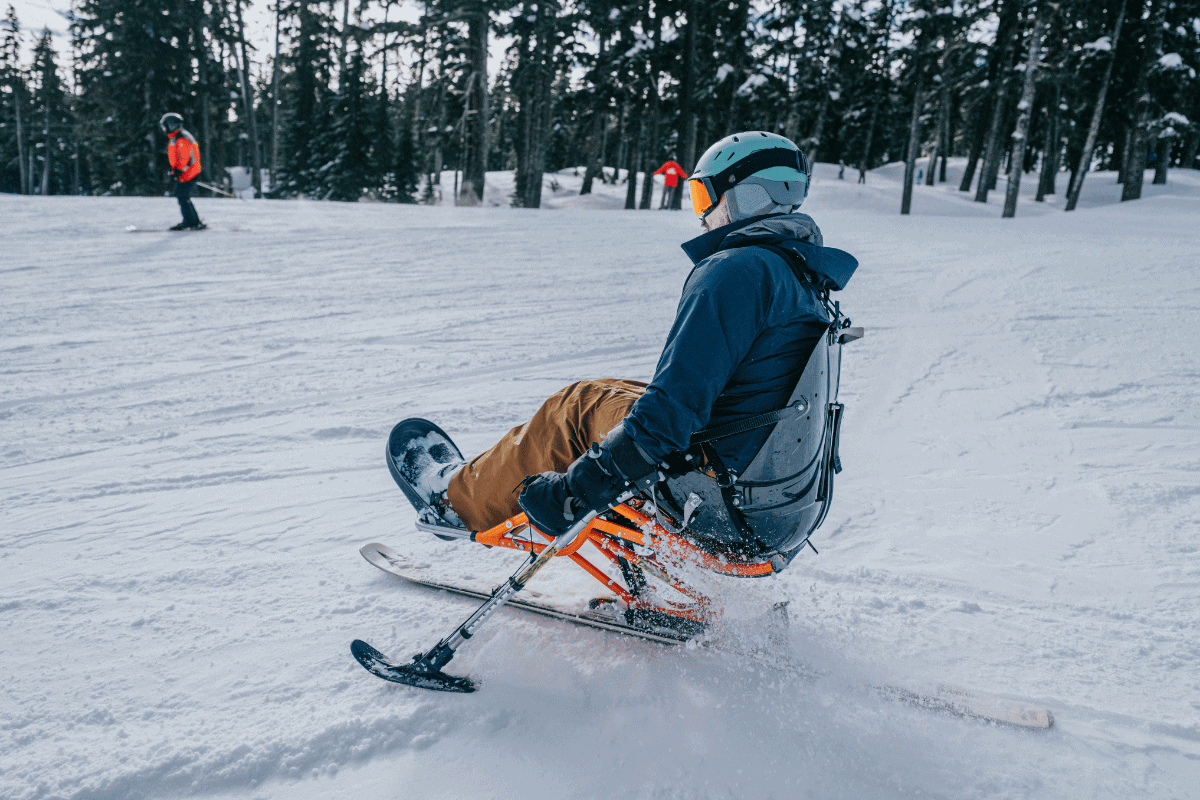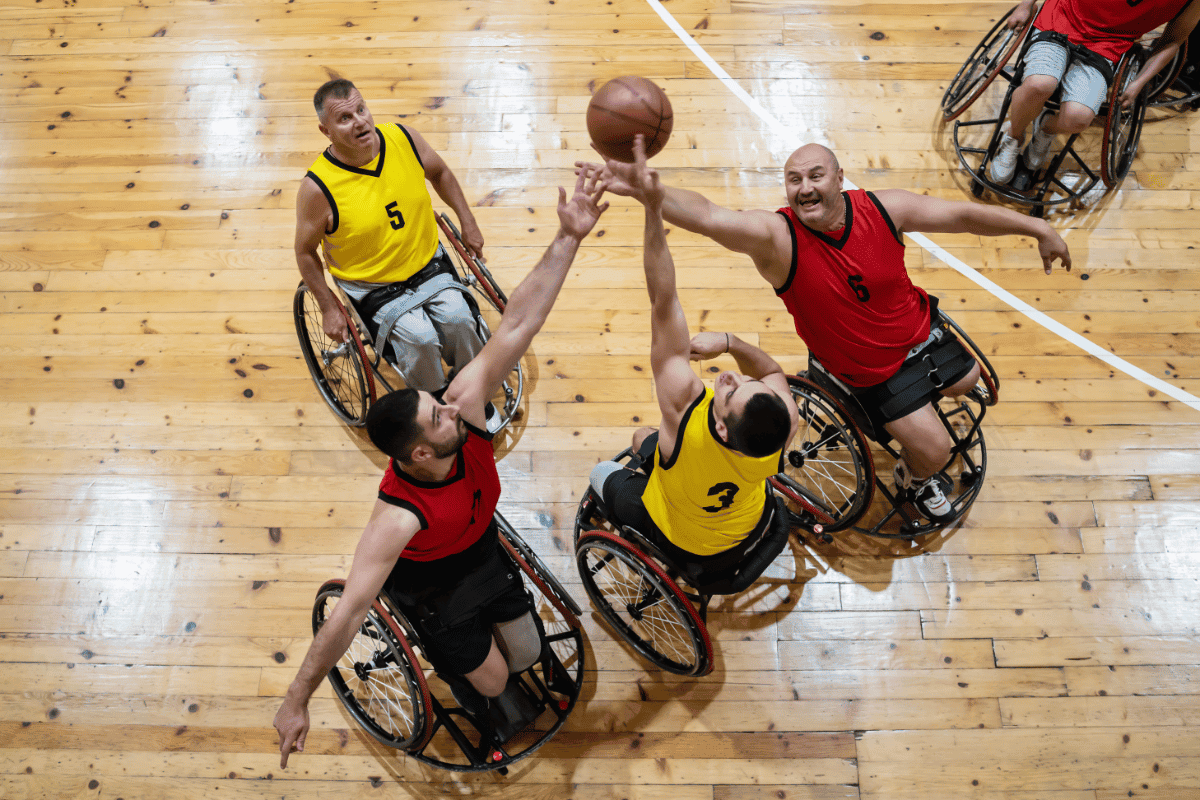Adaptive Sports and Recreation
Adaptive sports and recreation have become increasingly recognized for their ability to empower individuals with physical disabilities and create opportunities for inclusion and personal growth. From specialized equipment to tailored training programs, the world of adaptive sports offers a unique blend of athleticism and adaptability that has captured the attention of both athletes and advocates.
The impact of adaptive sports on physical and mental well-being is a topic that continues to garner attention, shedding light on the potential for these activities to not only enhance physical health, but also foster a sense of community and belonging.
Key Takeaways
- Adaptive sports enhance physical health and overall well-being.
- Adaptive sports foster a sense of community and social inclusion.
- Adaptive sports boost self-esteem and confidence.
- Adaptive sports provide individuals with disabilities the opportunity to participate and compete in various activities.
Benefits of Adaptive Sports
Engaging in adaptive sports has been shown to provide individuals with physical disabilities numerous physical, social, and emotional benefits, enhancing their overall well-being and quality of life. Inclusive fitness is a key aspect of adaptive sports, as it allows individuals of all abilities to participate in physical activities and improve their overall health.
Adaptive recreation programs offer a wide range of activities such as wheelchair basketball, hand cycling, and adaptive skiing, providing opportunities for individuals with disabilities to engage in regular exercise, which can lead to improved cardiovascular health, muscle strength, and flexibility.
Furthermore, adaptive sports foster a sense of community and social inclusion. Participants often form strong bonds with teammates and fellow athletes, creating a supportive network that can combat feelings of isolation and loneliness. The social aspect of adaptive sports contributes to improved mental well-being, boosting self-esteem and confidence.
Additionally, the competitive nature of adaptive sports can instill a sense of purpose and achievement, leading to greater emotional resilience and overall satisfaction with life.
Brands like Burton Snowboards are making strides in adaptive sports, offering equipment designed to empower individuals of all abilities to participate in recreational snowboarding.
Popular Adaptive Sports
Adaptive sports offer individuals with disabilities the opportunity to engage in various athletic activities, promoting physical fitness and social inclusion.
Wheelchair basketball provides a fast-paced and dynamic team sport, while adaptive skiing techniques allow individuals to experience the thrill of downhill skiing with specialized equipment and instruction.
Inclusive swimming programs cater to swimmers of all abilities, offering a supportive environment for individuals to enjoy the water and improve their skills.
Wheelchair Basketball Overview
Wheelchair basketball is a dynamic and competitive sport that offers individuals with physical disabilities the opportunity to engage in an exhilarating and challenging team game. This adaptive sport provides a platform for athletes with impairments to showcase their skills and athleticism.
The introduction of wheelchair basketball dates back to the 1940s and has since evolved to become a widely recognized Paralympic sport. The game follows similar rules and regulations to traditional basketball, with a few modifications to accommodate wheelchair users.
For instance, players are required to dribble the ball after pushing their wheelchairs twice, and the size of the court is smaller. These adaptations ensure fair play and enable individuals with varying levels of mobility to participate and compete at the highest level.
Adaptive Skiing Techniques
A fundamental aspect of adaptive sports that has garnered significant popularity is the mastery of adaptive skiing techniques. Adaptive skiing techniques involve the use of customized equipment and specialized instruction to accommodate individuals with physical disabilities, allowing them to experience the exhilaration of skiing.
These techniques vary based on the skier’s specific needs, such as sit-skiing for individuals with lower body impairments or visually impaired skiing with the assistance of guides. Accessible resorts play a crucial role in providing inclusive environments for adaptive skiers, offering adaptive equipment rentals, accessible facilities, and trained staff to ensure a safe and enjoyable experience.
Additionally, adaptive skiing techniques encompass a range of skills, including balance, core strength, and coordination, all of which are honed through adaptive instruction and practice.
Ultimately, adaptive skiing techniques empower individuals with disabilities to conquer slopes and revel in the freedom of movement and the thrill of the mountains.
Inclusive Swimming Programs
The mastery of adaptive skiing techniques has demonstrated the potential for individuals with disabilities to engage in various adaptive sports, including the increasingly popular inclusive swimming programs. In these programs, individuals with disabilities can participate in swimming activities with the help of specialized techniques and accessible facilities.
Here are some key aspects of inclusive swimming programs:
- Swimming Techniques: These programs focus on teaching adaptive swimming techniques that cater to the specific needs of individuals with disabilities, enabling them to enjoy the benefits of swimming in a safe and supportive environment.
- Inclusive Environment: Inclusive swimming programs provide a welcoming environment where participants of all abilities can come together to learn, practice, and compete in swimming activities.
- Accessible Facilities: These programs ensure that swimming facilities are equipped with necessary accommodations such as ramps, lifts, and accessible changing rooms to cater to individuals with disabilities.
- Qualified Instructors: The programs are led by qualified instructors who have expertise in adaptive swimming techniques and understand the needs of participants with various disabilities.
Equipment and Gear for Adaptive Sports
Adaptive sports and recreation demand specialized equipment and gear tailored to the unique needs and abilities of individuals participating in these activities. When it comes to adaptive sports equipment, gear selection is crucial to ensure the safety, comfort, and performance of the athletes. Adaptive sports technology has significantly advanced, offering a wide range of innovative gear designed to accommodate various disabilities and enhance athletic abilities. Additionally, proper gear maintenance is essential to ensure the longevity and functionality of adaptive sports equipment.
—
| Adaptive Sports Equipment | Description |
|---|---|
| Wheelchairs | Specifically designed for different sports such as basketball, tennis, and racing. |
| Prosthetics | Customized for specific sports activities, providing stability and support. |
| Handcycles | Designed for individuals with lower limb disabilities, offering an alternative to traditional bicycles. |
| Hearing-impaired Gear | Equipment with visual or vibrational feedback for athletes with hearing impairments. |
—
Inclusive Adaptive Recreation Programs
Advancing from the discussion of specialized equipment and gear for adaptive sports, the inclusive nature of adaptive recreation programs fosters a supportive and empowering environment for individuals of all abilities to engage in recreational activities. Inclusive adaptive recreation programs are designed to provide opportunities for individuals with diverse abilities to participate in various activities, promoting physical activity, social interaction, and overall well-being. These programs prioritize accessibility and inclusivity, ensuring that everyone can take part in the fun and adventure.
Here are some key aspects of inclusive adaptive recreation programs:
- Accessible Hiking: These programs offer accessible trails, adaptive hiking equipment, and trained staff to assist individuals with mobility challenges, enabling them to enjoy the beauty of nature and the physical benefits of hiking.
- Equitable Sailing: Inclusive sailing programs provide adaptive sailing equipment and trained instructors, ensuring that individuals with physical disabilities can experience the joy of sailing on equal terms with others.
- Adaptive Skiing: Adaptive skiing programs offer specialized equipment and trained instructors to enable individuals with physical disabilities to participate in alpine skiing, Nordic skiing, and snowboarding.
- Inclusive Team Sports: These programs provide opportunities for individuals of all abilities to engage in team sports such as wheelchair basketball, adaptive soccer, and seated volleyball, promoting teamwork, skill development, and social connections.
Training and Coaching for Adaptive Athletes
With a focus on enhancing athletic skills and fostering a supportive environment, training and coaching for adaptive athletes plays a pivotal role in optimizing performance and promoting personal growth. Coaching strategies for adaptive athletes are designed to address the unique needs and challenges they may face, ensuring that they receive tailored support to reach their full potential.
Athlete development in adaptive sports involves not only physical training but also mental and emotional support to help individuals overcome obstacles and excel in their chosen sport.
Coaching strategies for adaptive athletes often involve a multidisciplinary approach, with coaches working closely with physical therapists, occupational therapists, and other professionals to create comprehensive training programs. These programs are tailored to the specific abilities and goals of each athlete, focusing on skill development, strength training, endurance building, and injury prevention.
Moreover, coaches play a crucial role in fostering a supportive and inclusive team environment, where athletes feel empowered and motivated to push their boundaries.
The Impact of Adaptive Sports on Well-being
Adaptive sports have a profound impact on the well-being of individuals, offering both physical and mental benefits. These sports provide opportunities for individuals to improve their physical health and mental resilience, contributing to overall well-being.
Additionally, adaptive sports foster social inclusion and support, creating a sense of community and belonging for participants.
Physical and Mental Benefits
Participating in adaptive sports has been shown to have a profound impact on the physical and mental well-being of individuals with disabilities, providing them with opportunities for physical activity, social interaction, and personal growth. The benefits of adaptive sports extend beyond the physical, contributing to mental resilience and overall well-being.
The following are some of the key physical and mental benefits:
- Improved Physical Health: Engaging in adaptive sports can function as a form of physical therapy, helping individuals improve their strength, endurance, and flexibility.
- Enhanced Mental Resilience: Adaptive sports can contribute to increased mental resilience, helping individuals develop coping strategies and overcome challenges.
- Social Connection: Participation in adaptive sports fosters social interaction, reducing feelings of isolation and promoting a sense of community.
- Increased Self-esteem: Adaptive sports provide individuals with a sense of accomplishment and empowerment, leading to improved self-esteem and confidence.
Social Inclusion and Support
The impact of adaptive sports on well-being extends far beyond physical health, as it plays a crucial role in fostering social inclusion and providing invaluable support for individuals with disabilities.
Engaging in adaptive sports creates a sense of belonging and community, promoting social integration and reducing feelings of isolation. Through participation in these activities, individuals with disabilities often find themselves surrounded by supportive communities that understand and empathize with their challenges. This social inclusion not only enhances their overall well-being but also contributes to their mental and emotional health.
Adaptive sports provide a platform for individuals to form meaningful connections, share experiences, and receive encouragement from peers and mentors. The supportive environment created by adaptive sports significantly contributes to the holistic well-being of individuals with disabilities, emphasizing the profound impact beyond physical health.
Advocacy and Support for Adaptive Sports
Efforts to promote and advocate for the inclusion and support of adaptive sports have significantly enhanced access and opportunities for individuals with disabilities to engage in recreational activities. This advocacy has led to tangible changes that benefit the adaptive sports community, including:
- Accessible facilities: Advocacy efforts have pushed for the development of accessible sports facilities, ensuring that individuals with disabilities have the necessary infrastructure to participate in various sports and recreational activities.
- Policy initiatives: Advocates have worked to influence policy at local, regional, and national levels, leading to the implementation of regulations and laws that support adaptive sports and recreation.
- Program development: Through community engagement, advocates have fostered the creation of adaptive sports programs, providing individuals with disabilities the chance to participate in a wide range of athletic endeavors.
- Educational outreach: Advocacy efforts have focused on educating the public about the importance of adaptive sports, promoting inclusivity, and challenging stereotypes and misconceptions surrounding individuals with disabilities.

Conclusion
In conclusion, adaptive sports and recreation offer a bridge to a world of endless possibilities. The benefits of participation extend beyond physical prowess, reaching into the realm of emotional and mental well-being.
The equipment and gear designed for adaptive sports facilitate an inclusive and empowering experience. With the support of advocacy and inclusive programs, adaptive athletes can thrive and excel, breaking barriers and reaching new heights.
The impact of adaptive sports on individuals is a tapestry of resilience, determination, and triumph.









